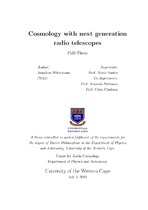Cosmology with next generation radio telescopes
Abstract
The next generation of radio telescopes will revolutionize cosmology by
providing large three-dimensional surveys of the universe. This work presents
forecasts using the technique 21cm intensity mapping (IM) combined with
results from the cosmic microwave background, or mock data of galaxy
surveys. First, we discuss prospects of constraining curvature independently
of the dark energy (DE) model, finding that the radio instrument HIRAX
will reach percent-level accuracy even when an arbitrary DE equation of state
is assumed. This is followed by a study of the potential of the multi-tracer
technique to surpass the cosmic variance limit, a crucial method to probe
primordial non-Gaussianity and large scale general relativistic e↵ects. Using
full sky simulations for the Square Kilometre Array phase 1 (SKA 1 MID)
and the Large Synoptic Survey Telescope (LSST), including foregrounds, we
demonstrate that the cosmic variance contaminated scenario can be beaten
even in the noise free case. Finally, we derive the signal to noise ratio for the
cosmic magnification signal from foreground HI intensity maps combined
with background galaxy count maps. Instruments like SKA1 MID and
HIRAX are highly complementary and well suited for this measurement.
Thanks to the powerful design of the planned radio instruments, all results
confirm their potential and promise an exciting future for cosmology.

